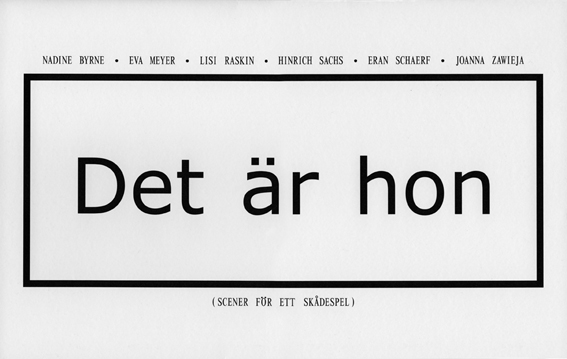Over the timespan of nearly five years the authors’ collective, formed by visual artist and musician Nadine Byrne, writer and philosopher Eva Meyer, visual artists Lisi Raskin, Hinrich Sachs, and Eran Schaerf, as well as architect Joanna Zawieja, has been working on the script for a theatre play. Starting point for the collaboration in 2007 was coined by a shared interest for the historical event which has become one of the founding myths of Moderna Museet Stockholm:
Hon, en katedral. A monumental reclining Nana within the museum building on Skeppsholmen, built in 1966 by Niki de Saint Phalle in close collaboration with her husband Jean Tinguely and the artist collegue Per Olof Ultvedt upon invitation by the museum director Pontus Hultén, who was an active contributor himself. Not only was Hon at the time a remarkable attraction, it furthermore created a significant impact on the shaping of a persistent common expectation of how contemporary art should ideally be: colorful, fun, accessible, and inviting to participate.
The framework of current discussions within the discourse on art on the concept of re-enactment, the habit of referring to historical works, as well as the tendency to employ scripted performances and actors, provide a larger scheme for the collective’s interest in Hon from today’s perspective. Whereas a physical reconstruction of the famous exhibition only would have seemed to reassure expectations in a nostalgic way, the decision to juxtapose reported memories and archive material with the voice of a time-traveling female character, a search engine, and a host, transforming it into a script for a theatre play provides the raw material for a range of options to engage with the aforementioned myth. Once conceived as a provocative, maybe proto-feminist, gesture to shake up the museum, the time seems ready to collaboratively question her current role and potential within a discussion on expectations towards contemporary art and its institutionalization.
The theatre script
It’s Her. Scenes for a play is designed in close collaboration with Lina Grumm and Annette Lux from HIT, Berlin and the publication unites different theatrical components such as stage directions, choreographic instructions, monologue, as well as a stage design, revolving around space, gender, collective memory, and interpretation, ready to be brought on stage.


